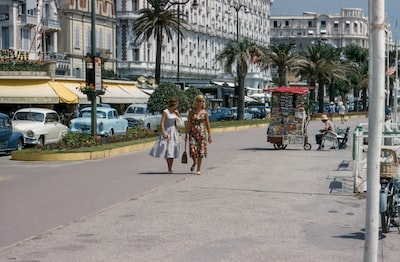In the age of fast fashion and mass production, Gen Z fashion trends have veered towards a sustainable path, igniting a love affair with preloved treasures. We fashion-savvy youngsters are embracing vintage clothing and second-hand shopping like never before, challenging the notion that style must always come brand new.
With a blend of nostalgia and eco-consciousness, we are rewriting the fashion narrative and influencing the industry with our unique sense of style. From rummaging through thrift stores to scouring online resale platforms, Gen Z has transformed the perception of ‘used’ into coveted fashion finds.
The allure of finding one-of-a-kind pieces, reimagining them with a modern twist, and supporting a circular economy is at the core of this movement. As we fashion-forward individuals become the tastemakers and decision-makers of tomorrow, brands are taking notice and capitalizing on our love for preloved treasures to drive PR campaigns that align with our values.
By showcasing the stories behind each garment, highlighting the sustainability aspect, and promoting the individuality that comes with vintage fashion, brands are successfully capturing our attention and loyalty. These PR campaigns not only tap into the authentic appeal of second-hand clothing but also contribute to a larger societal shift towards a more conscious and ethical fashion industry.
So, what once may have been deemed old-fashioned or unfashionable is now being celebrated as the very epitome of style by Gen Z, setting the stage for a new era of fashion that embraces the old alongside the new.
Table of Contents
Understanding the Gen Z Market
Understanding the preferences and characteristics of Gen Z is crucial for creating successful PR strategies. Social media platforms like Instagram and TikTok offer great opportunities to connect with this tech-savvy generation. Using these platforms enables creative content creation and engaging with the target audience in an authentic way. Collaborating with influential Gen Z personalities or micro-influencers can also enhance brand visibility and credibility.
Gen Z values experiences, so organizing events or pop-up shops where they can interact with the brand can make a lasting impression. Furthermore, emphasizing sustainability as a selling point is essential for attracting environmentally-conscious Gen Z consumers. Incorporating eco-friendly practices into marketing efforts and highlighting the benefits of buying second-hand items can strongly resonate with this demographic. By employing these PR tactics, used merchandise stores can effectively capture the attention and loyalty of the Gen Z market.
Leveraging Social Media Platforms
According to a report by McKinsey & Company, there has been a significant shift in consumer behavior among Gen Z. They are now more likely to shop second-hand, with 41% indicating a preference for used or vintage items. This change can be attributed to several factors, including a desire for unique fashion pieces, financial considerations, and a growing awareness of sustainable practices in the fashion industry. The rise of online platforms dedicated to reselling and thrift shopping has also contributed to the popularity of preloved items among Gen Z. These platforms offer convenience and affordability, enabling Gen Z consumers to discover hidden gems and express their individuality through fashion choices. Additionally, the social aspect of thrifting, where items have stories and can be shared among friends, aligns with Gen Z’s values of community and sustainability. This newfound love for preloved treasures presents a unique opportunity for used merchandise stores to effectively target and cater to this market segment.
In order to tap into Gen Z’s love for preloved treasures, PR campaigns are essential in creating awareness and promoting used merchandise stores. Gen Z has a strong presence on social media platforms, where they share their fashion finds and seek inspiration. Brands can leverage social media to showcase their unique offerings and engage with their target audience directly. Collaborating with popular Gen Z influencers or micro-influencers can also be an effective strategy to reach Gen Z consumers. This approach helps establish trust and authenticity among the target audience. Furthermore, creating memorable experiences through events like vintage fairs or clothing swaps can attract Gen Z consumers who value unique and interactive shopping experiences. By aligning with Gen Z’s preferences for sustainable and budget-friendly fashion choices, used merchandise stores can capture their attention and build lasting relationships with this growing consumer segment.
Influencer Collaborations for Greater Brand Visibility
Gen Z heavily relies on social media influencers for fashion inspiration and recommendations. By partnering with relevant influencers that align with the brand’s values and style, used merchandise stores can effectively target a wider audience and gain credibility among Gen Z consumers. These collaborations can take various forms, such as sponsored content, brand ambassadorships, or product reviews, enabling influencers to showcase the unique and trendy finds from the store.
The genuine enthusiasm and authenticity of influencers connect with Gen Z, increasing their trust and engagement with the brand. Additionally, influencers foster a strong sense of community and actively engage with their followers, creating a platform for dialogue and brand advocacy. Leveraging influencer collaborations not only boosts brand visibility but also establishes a connection with Gen Z consumers who value recommendations from their favorite influencers in their purchasing decisions.
According to a study by Mediakix, 89% of marketers reported that influencer marketing campaigns yield comparable or better ROI than other channels. The study also found that partnering with influencers can generate up to 11 times higher ROI compared to traditional advertising. This data reinforces the value and effectiveness of influencer collaborations in targeting Gen Z consumers.
The study further highlights the impact of influencer content on user engagement, with audiences actively interacting with influencer posts through likes, comments, and shares. This engagement not only drives brand awareness but also increases the likelihood of consumers discovering and exploring used merchandise stores. Influencer collaborations allow brands to tap into the trust and influence built by influencers with their followers, resulting in a positive brand association and driving traffic to the stores.
By strategically selecting and partnering with influencers, used merchandise stores can leverage this powerful marketing channel and effectively reach the Gen Z audience, leading to increased brand awareness, engagement, and ultimately, sales.
Creating Memorable Experiences Through Events
Embracing second-hand fashion offers a platform for individuals to express their unique style and stand out from the crowd. For Gen Z, in particular, curating their wardrobes with vintage or thrifted pieces is a way to showcase their individuality. Moreover, the affordability of preloved items aligns perfectly with this generation’s desire for budget-friendly fashion. They seek alternatives to traditional retail that not only offer value but also allow them to maintain their style. By purchasing second-hand items, they can unearth fashion treasures at a fraction of the price, granting them more purchasing power and endless opportunities to update their wardrobe. This choice also reflects Gen Z’s growing interest in sustainable and eco-friendly practices, providing them with a means to reduce fashion’s environmental impact.
ThredUp’s 2020 Resale Report unveils shocking projections for the second-hand market, estimating its worth to reach a staggering $64 billion by 2024. This remarkable growth signifies the immense potential and relevance of preloved items, especially among Gen Z. The report further illustrates that 70% of Gen Z consumers have already engaged in or are open to purchasing second-hand items. The shift towards second-hand shopping is predominantly motivated by Gen Z’s deep-rooted commitment to sustainability and their fight against the adverse environmental effects of fast fashion. Moreover, Gen Z perceives second-hand shopping as an opportunity to manifest their individuality and creativity in the realm of fashion. With the ease of online platforms and reselling apps at their disposal, Gen Z consumers can effortlessly stumble upon unique fashion treasures, with just a few clicks. The rising popularity of second-hand fashion presents an incredible chance for used merchandise stores to enter this flourishing market and tailor their public relations campaigns accordingly.
Sustainability as a Selling Point
Used merchandise stores have a unique opportunity to target environmentally-conscious Gen Z consumers by promoting sustainability as a key selling point in their PR campaigns. By emphasizing the eco-friendly aspects of shopping for preloved items, these stores can not only capture the attention of this target audience but also foster long-term loyalty. Practices like extending the lifespan of clothing and reducing waste align perfectly with Gen Z’s values of reducing their carbon footprint. Additionally, highlighting the positive impact of shopping second-hand, such as reducing textile waste and supporting a circular economy, can effectively attract Gen Z consumers who are actively seeking to make a difference through their consumer choices. By incorporating sustainability as a core message in their PR campaigns, used merchandise stores not only add value to their brand but also demonstrate their commitment to environmental responsibility, which greatly appeals to Gen Z consumers who prioritize sustainability.
A recent study conducted by Nielsen revealed that a staggering 73% of global Gen Z respondents are willing to pay more for sustainable products. This data clearly showcases the immense market potential and eagerness of Gen Z consumers to support sustainable brands. Therefore, by positioning used merchandise stores as viable sustainable alternatives to traditional retail, these stores can tap into the growing demand for eco-friendly fashion choices among Gen Z. The study further highlights that sustainability has become an integral part of Gen Z’s brand perception, heavily influencing their brand preference and loyalty. Consequently, used merchandise stores that effectively integrate sustainability into their PR campaigns and effectively communicate their commitment to the environment can set themselves apart in this highly competitive market, thereby attracting Gen Z consumers who prioritize sustainability. Furthermore, by incorporating sustainable practices into every aspect of their business, from sourcing to packaging, these stores not only solidify their brand’s credibility but also resonate deeply with the eco-conscious values of Gen Z consumers.
Targeting Generation Z: How AffluencePR Can Help Used Merchandise Stores Successfully Engage this Tech-Savvy and Socially Conscious Audience
In an ever-growing market of used merchandise stores, it is crucial to effectively target Generation Z, the tech-savvy and socially conscious demographic. AffluencePR, a Singapore-based integrated marketing agency established in 2017, is well-equipped to assist in this endeavor.
With their range of services, including branding, marketing positioning, public relations, digital/social media campaign management, and marketing research, AffluencePR can devise a comprehensive strategy specifically tailored to engage and captivate the Gen Z audience. By understanding the unique preferences and behaviors of this generation, they can craft compelling storytelling, leverage social media platforms, and create interactive experiences that resonate with Gen Z’s desire for authenticity, sustainability, and affordability.
Whether it is through influencer collaborations, engaging content creation, or immersive virtual experiences, AffluencePR can help used merchandise stores effectively connect with and convert Gen Z consumers into loyal patrons.
Frequently Asked Questions
Gen Z refers to the generation of individuals born between the mid-1990s and mid-2000s.
Preloved treasures are secondhand items that have been previously owned by someone else but are still in good condition and have value.
Some PR campaigns that target Gen Z’s love for preloved treasures include ‘Sustainable Style’, ‘Secondhand Chic’, and ‘Thrifty Trends’.
Gen Z loves preloved treasures due to their sustainability aspect, affordability, uniqueness, and the opportunity to express individual style.
PR campaigns promote preloved treasures to Gen Z by showcasing their environmental benefits, affordability, styling possibilities, and by collaborating with influencers and celebrities who support and endorse secondhand fashion.
PR campaigns play a crucial role in shaping Gen Z’s perception of preloved treasures by highlighting their value, desirability, and positive impact on sustainability and fashion industry ethics.
Recap
Finding effective ways to target Gen Z for used merchandise stores has become crucial in today’s consumer landscape. With their unique preferences and a keen focus on sustainability, this demographic presents both challenges and opportunities for PR strategies.
To capture their attention, it is imperative to employ dynamic and tailored approaches that resonate with their values. By leveraging social media influencers, utilizing grassroots marketing techniques, and forging partnerships with sustainable fashion movements, used merchandise stores can foster a genuine connection with Gen Z.
Moreover, creating an immersive in-store experience, where consumers can explore and curate their own style, will undoubtedly pique their interest. To further entice this generation, adopting a circular economy narrative and emphasizing the inherent value of pre-loved items could amplify their engagement. As Gen Z values authenticity and individuality, it is essential to craft storytelling campaigns highlighting the unique stories carried by each secondhand piece.
Finally, leveraging data analytics to understand their browsing and purchasing behaviors ensures targeted messaging and personalized recommendations, leading to increased customer loyalty. By embracing these multifaceted strategies, used merchandise stores can effectively tap into the immense potential of Gen Z consumers, while simultaneously promoting sustainability within the fashion industry.






